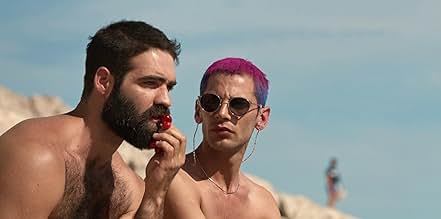IMDb रेटिंग
6.7/10
1.5 हज़ार
आपकी रेटिंग
अपनी भाषा में प्लॉट जोड़ेंWhile having a day-long swim at Athens' queer beach, best friends Demos and Nikitas recall the events of a recent summer in the prospect of turning them into a screenplay for Nikitas' featur... सभी पढ़ेंWhile having a day-long swim at Athens' queer beach, best friends Demos and Nikitas recall the events of a recent summer in the prospect of turning them into a screenplay for Nikitas' feature debut.While having a day-long swim at Athens' queer beach, best friends Demos and Nikitas recall the events of a recent summer in the prospect of turning them into a screenplay for Nikitas' feature debut.
- निर्देशक
- लेखक
- स्टार
- पुरस्कार
- 4 जीत और कुल 16 नामांकन
फ़ीचर्ड समीक्षाएं
Our hero is Demosthenes (played by hunky Yorgos Tsiantoulas), who recently broke up with his partner Panos (Nikolaos Mihas) after a four-year relationship. His best friend is Nikitas (Andreas Labropoulos), a former actor who is now a director.
Sitting on a nude beach where gay cruising is the order of the day, Nikitas and Demosthenes try to come up with ideas for a script Nikitas has to present as his next film project. Demosthenes reflects on his own life as inspiration for the film.
As Demosthenes tells his story, the film jumps backwards and forward depicting the events. We learn quite a bit about each character in the process. Although Demosthenes broke up with Panos, we still notice hints of regret despite him trying to convince Nikitas otherwise. We also meet Demosthenes' mom, who looks after his sick father. And then there's the dog, Carmen, who changes everyone's lives.
Filled with gorgeous physiques and full frontal male nudity, there's plenty of eye candy to keep you drooling, depending on your inclinations, off course. Apart from that, I found the film very realistic. The drama and humour were well balanced and never over the top or sentimental. It was current and relatable. I also thought the actors were perfectly cast in their respective roles.
Sitting on a nude beach where gay cruising is the order of the day, Nikitas and Demosthenes try to come up with ideas for a script Nikitas has to present as his next film project. Demosthenes reflects on his own life as inspiration for the film.
As Demosthenes tells his story, the film jumps backwards and forward depicting the events. We learn quite a bit about each character in the process. Although Demosthenes broke up with Panos, we still notice hints of regret despite him trying to convince Nikitas otherwise. We also meet Demosthenes' mom, who looks after his sick father. And then there's the dog, Carmen, who changes everyone's lives.
Filled with gorgeous physiques and full frontal male nudity, there's plenty of eye candy to keep you drooling, depending on your inclinations, off course. Apart from that, I found the film very realistic. The drama and humour were well balanced and never over the top or sentimental. It was current and relatable. I also thought the actors were perfectly cast in their respective roles.
The movie-within-a-movie narrative is a popular cinematic storytelling approach, but, to my knowledge, writer-director Zacharias Mavroeidis's fourth feature outing is the first film to make use of it in the LGBTQ+ genre. This endearing gay comedy-drama tells the story of two long-time best friends, Demosthenes (Yorgos Tsiantoulas), a former actor-turned civil servant, and Nikitas (Andreas Labropoulos), a former actor-turned aspiring filmmaker, who try to come up with a concept for the would-be auteur's latest movie project while hanging out together at a nude beach on the stunningly beautiful Greek seacoast. They toss around a variety of ideas, but they get the most traction out of a story and script based on the waning days of Demos's relationship with his former partner, Panos (Nikolaos Mikas), two summers earlier, a breakup for which Nikitas had a tolerance-testing front row seat. The events of that awkward, protracted separation are depicted here in a series of flashbacks in which the duo struggles to figure out where things went wrong and why, an examination that ultimately ends up revealing more about them as individuals than as a couple. In the process, the film presents a refreshingly authentic, often-revealing look at the dynamics of relationships and friendships among gay men, particularly when it comes to matters of honesty and commitment, both in and out of partnership contexts. And, along the way, the authors of this evolving production simultaneously look for ways to spice up their work, an exercise in inspired creativity, emboldened social activism, fiercely courageous self-acceptance, constrained moviemaking economics, challenging family relations and even benevolent pet care. However, the breadth of material presented in this story is, admittedly, a lot to skillfully massage into a coherent finished product. The filmmaker seems sincere enough in what he's trying to say, but he also comes across as somewhat inundated in trying to pull it all together into a neat and tidy package. To be sure, there are many earnest moments and flashes of brilliant humor here, but there's also a tendency to meander and a good deal of extraneous material that could have easily been deleted. This is perhaps most noticeable in the final act, where the momentum starts to sputter, almost as if the director doesn't quite know how to wrap things up. "The Summer with Carmen" truly represents an ambitious effort with decidedly mature, thoughtful sensibilities running throughout (arguably much more so than what one typically sees in many LGBTQ+ films), but it's also one that could have benefitted greatly from an editor unafraid to make the necessary cuts to allow it to shine as brightly as it might have.
This is an incredibly well-constructed movie, brimming with irony and following the tragic yet thought-provoking patterns reminiscent of ancient philosophers like Plato. The narrative subtly explores the complexities of human emotions, where the love between the main characters remains purely platonic, highlighting themes of connection beyond the physical.
A special mention goes to the dog, who delivered a surprisingly nuanced performance. Her presence is not just charming but integral to the plot, adding emotional depth and symbolizing loyalty and companionship in ways that enhance the storytelling.
The film's unique sense of humor stands out, masterfully blending subtle wit with a post-ironic visual narrative that keeps the audience engaged. This clever approach elevates the movie, offering layers of meaning that invite reflection long after the credits roll.
I give it an extra 100 out of 100 for its brilliance-both in its humor and innovative narrative structure. It's been over 100 minutes of pure cinematic delight, leaving me entertained and impressed in equal measure.
A special mention goes to the dog, who delivered a surprisingly nuanced performance. Her presence is not just charming but integral to the plot, adding emotional depth and symbolizing loyalty and companionship in ways that enhance the storytelling.
The film's unique sense of humor stands out, masterfully blending subtle wit with a post-ironic visual narrative that keeps the audience engaged. This clever approach elevates the movie, offering layers of meaning that invite reflection long after the credits roll.
I give it an extra 100 out of 100 for its brilliance-both in its humor and innovative narrative structure. It's been over 100 minutes of pure cinematic delight, leaving me entertained and impressed in equal measure.
The storyline isn't terrible, but it's evident that the film's primary target audience is the Greek community. The lead actor's frequent nudity seems calculated to draw in viewers and generate buzz, but in my opinion, it detracts from the overall authenticity of the film. Tsiantoulas's performance is inconsistent, indicating a lack of effective direction from the filmmaker, which might have better served to guide him to a more convincing portrayal. Additionally, the film straddles the line between comedy and drama without fully committing to either genre. In summary, while it's worth a watch, particularly for a Greek audience, it's best to approach it with tempered expectations.
When I started watching this movie, I thought, "An ordinary audience will probably think the film includes too much nudity." When I read the reviews, I realized I was right. However, this film doesn't actually contain excessive nudity. Instead, it portrays an aspect of gay culture. One of the most misguided judgments originating from a heterosexual mindset has always been the attempt to equate gay culture with heterosexual culture.
Yes, gays demand to be treated equally in society regarding rights and freedoms, and they are absolutely justified in this demand. The modern world has started to pave the way for equality, although there is still a long road ahead to achieve complete equality and freedom. However, we must understand that gay culture cannot be reduced to just a relationship between two people of the same sex. It is a broader concept that includes unique elements.
In gay culture, the way social life is lived may share similarities with heterosexuality, but the lifestyle demonstrates notable differences. For example, open relationships, orgies, and group dynamics are more widely accepted within gay culture than in heterosexual culture. Sexuality, rather than just sex, is a defining feature of gay culture and plays a crucial role in shaping identity.
Returning to the movie: yes, it features nudity, but this serves as a colorful element that adds cheerfulness and reminds viewers that the film stems from gay culture.
As for the movie itself, I liked it very much. Above all, experiencing Greece during the summertime made me feel wonderful. The actors-Yorgos Tsiantoulas (Demosthenes), Andreas Labropoulos (Nikitas), Nikolaos Mihas (Panos), Roubini Vasilakopoulou (Keti), Vasilis Tsigristaris (Thymios), and others-deliver outstanding performances. Their acting convinces us that they are as real as we are. The dialogues between the characters are relatable and innocent.
While the movie avoids diving deeply into melancholy, it provides a strong depiction of the characters' past experiences. The film's greatest success lies in its technique. The script and direction employ an innovative storytelling method. Flashbacks, typewritten notes, and structuring the film as a discussion of a movie scenario are completely fresh elements. For this, the director, Zacharias Mavroeidis (also the scriptwriter), and Fondas Chalatsis, the co-scriptwriter, deserve congratulations.
If you are a heterosexual viewer and find gay nudity disturbing, consider how many heterosexual nude scenes a gay audience sees in mainstream movies. Gay individuals endure many such scenes-not only in movies but also in commercials, magazines, TV shows, billboards, and daily life. Try to view it from their perspective.
Yes, gays demand to be treated equally in society regarding rights and freedoms, and they are absolutely justified in this demand. The modern world has started to pave the way for equality, although there is still a long road ahead to achieve complete equality and freedom. However, we must understand that gay culture cannot be reduced to just a relationship between two people of the same sex. It is a broader concept that includes unique elements.
In gay culture, the way social life is lived may share similarities with heterosexuality, but the lifestyle demonstrates notable differences. For example, open relationships, orgies, and group dynamics are more widely accepted within gay culture than in heterosexual culture. Sexuality, rather than just sex, is a defining feature of gay culture and plays a crucial role in shaping identity.
Returning to the movie: yes, it features nudity, but this serves as a colorful element that adds cheerfulness and reminds viewers that the film stems from gay culture.
As for the movie itself, I liked it very much. Above all, experiencing Greece during the summertime made me feel wonderful. The actors-Yorgos Tsiantoulas (Demosthenes), Andreas Labropoulos (Nikitas), Nikolaos Mihas (Panos), Roubini Vasilakopoulou (Keti), Vasilis Tsigristaris (Thymios), and others-deliver outstanding performances. Their acting convinces us that they are as real as we are. The dialogues between the characters are relatable and innocent.
While the movie avoids diving deeply into melancholy, it provides a strong depiction of the characters' past experiences. The film's greatest success lies in its technique. The script and direction employ an innovative storytelling method. Flashbacks, typewritten notes, and structuring the film as a discussion of a movie scenario are completely fresh elements. For this, the director, Zacharias Mavroeidis (also the scriptwriter), and Fondas Chalatsis, the co-scriptwriter, deserve congratulations.
If you are a heterosexual viewer and find gay nudity disturbing, consider how many heterosexual nude scenes a gay audience sees in mainstream movies. Gay individuals endure many such scenes-not only in movies but also in commercials, magazines, TV shows, billboards, and daily life. Try to view it from their perspective.
क्या आपको पता है
- ट्रिवियाThe golden rules of screenwriting listed in the film are: 1/ every movie has 3 acts 2/ every movie has a hero 3/ every hero has a goal 4/ every hero changes in pursuit of their goal
- गूफ़At the final scene you can see the boom mic at the bottom edge of the frame meanwhile Nikitas and Demosthenes have their last talk.
- कनेक्शनFeatures Washingtonia (2014)
टॉप पसंद
रेटिंग देने के लिए साइन-इन करें और वैयक्तिकृत सुझावों के लिए वॉचलिस्ट करें
- How long is The Summer with Carmen?Alexa द्वारा संचालित
विवरण
बॉक्स ऑफ़िस
- दुनिया भर में सकल
- $21,235
- चलने की अवधि
- 1 घं 46 मि(106 min)
- रंग
- पक्ष अनुपात
- 1.85 : 1
इस पेज में योगदान दें
किसी बदलाव का सुझाव दें या अनुपलब्ध कॉन्टेंट जोड़ें


































